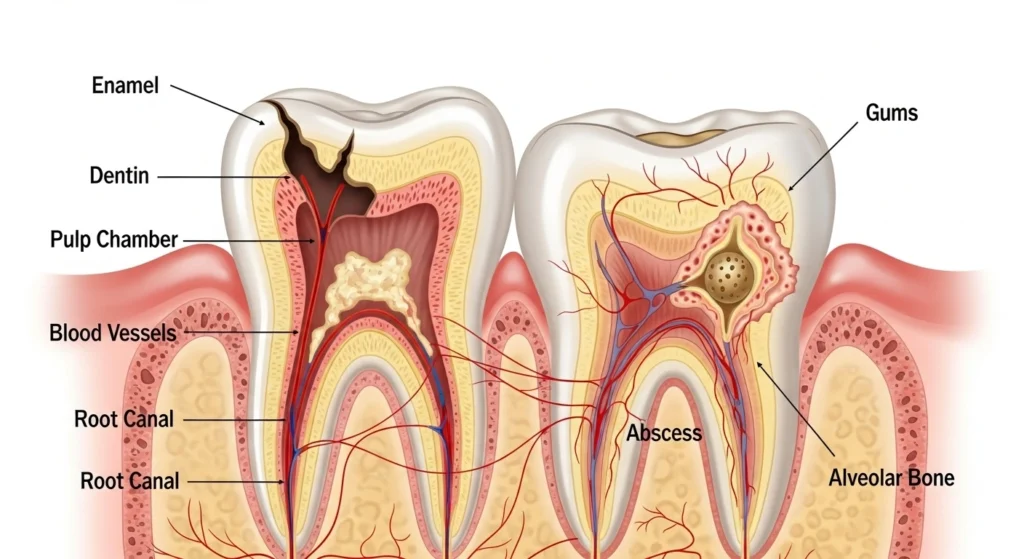Summary
Can a Tooth Infection Cause Hair Loss? A tooth infection can cause hair loss due to the body’s immune response and stress, which can disrupt hair growth. Inflammation from the infection may lead to temporary hair shedding, often through a condition called telogen effluvium.
Early treatment of dental infections and proper oral care are key to preventing both tooth and hair health issues. Once the infection is resolved, hair typically regrows.
Introduction
Tooth infections are a common health issue, but can a tooth infection cause hair loss? In this article, we’ll explore the surprising connection between dental health and hair loss, and how untreated infections can lead to shedding.
By understanding how tooth infections can affect your overall health, you can take proactive steps to prevent hair loss. We’ll also offer expert advice on preventing and managing these issues to protect both your hair and teeth.

The Connection Between Tooth Infections and Hair Loss
When we think about tooth infections, hair loss is probably the last thing that comes to mind. However, a severe dental issue, such as an untreated tooth abscess, can cause systemic effects on your body, potentially leading to hair loss.
A tooth infection is a result of bacteria infecting the pulp inside a tooth, often due to cavities, cracks, or poor dental hygiene. If left untreated, it can lead to inflammation and an immune response. Your body’s reaction to infection can disrupt your overall health, which may include unexpected consequences, such as hair shedding.
Key Points:
- Tooth infections lead to inflammation that can impact overall health.
- Immune responses triggered by infections may affect hair follicles.
- Stress caused by infection can contribute to temporary hair loss.
How a Tooth Infection Can Lead to Hair Loss
A tooth infection doesn’t directly cause hair loss in the way that a poor diet or genetics might. However, the systemic effects of untreated dental infections can contribute to hair shedding, especially when stress and inflammation are involved.
- Immune Response and Inflammation:
When your body fights an infection, it releases cytokines, proteins that help fight disease. While this is a natural process, high levels of cytokines can negatively affect hair follicles, pushing them into a dormant phase where hair falls out more easily. - Stress and Hormonal Imbalance:
Chronic pain from an infection or the stress of dealing with severe oral health issues can trigger telogen effluvium. This is a temporary hair loss condition caused by stress, illness, or trauma. The disruption in hair cycles can cause thinning or shedding of hair, which may improve once the underlying issue is resolved. - Bacterial Spread:
In rare cases, a severe tooth infection can spread through the bloodstream, potentially affecting other organs and systems in the body, including the scalp. Though this is uncommon, it can further stress the body and contribute to hair loss.
Medical Conditions That Can Exacerbate Both Tooth Infections and Hair Loss
Certain health conditions may make both tooth infections and hair loss more likely. If you’re dealing with any of these conditions, it’s essential to manage both your dental and overall health to prevent further complications.
- Diabetes:
People with diabetes are more susceptible to infections, including tooth infections, due to their compromised immune system. High blood sugar can also disrupt the normal growth cycle of hair, leading to thinning or hair loss. - Autoimmune Diseases:
Conditions like lupus or rheumatoid arthritis can cause both chronic inflammation and tooth problems, as well as hair loss. Inflammation caused by autoimmune diseases can affect the scalp and other areas of the body, causing hair follicles to become dormant. - Nutritional Deficiencies:
Poor nutrition can exacerbate both tooth health and hair loss. Deficiencies in vitamins such as iron, vitamin D, or biotin can lead to weaker hair and teeth, making infections and hair loss more common.
How to Prevent and Treat Tooth Infections to Avoid Hair Loss
Taking steps to prevent and treat tooth infections is essential for protecting both your dental health and hair. Below are some actionable tips:
- Maintain Proper Oral Hygiene:
Regular brushing, flossing, and visits to the dentist will prevent tooth decay and reduce the risk of infections. - Treat Tooth Infections Early:
If you notice signs of a tooth infection, such as pain, swelling, or fever, seek medical attention promptly. Early intervention will reduce the risk of complications, including those that could impact your hair. - Manage Stress:
If you are dealing with dental problems, it’s important to manage stress. Meditation, exercise, and relaxation techniques can help reduce stress levels and improve your overall health. - Get Adequate Nutrition:
Ensure your diet includes essential nutrients to support both oral and hair health, including vitamins A, C, D, and E, as well as iron and zinc.

Can Hair Grow Back After Hair Loss Caused by Tooth Infections?
The good news is that hair loss caused by a tooth infection is typically temporary. Once the infection is treated, and your immune system is no longer in overdrive, hair can regrow. However, it’s important to address the infection promptly and follow through with the necessary care to avoid further complications.
If hair loss is persistent, consulting with a dermatologist or a hair restoration expert can help determine if there are other underlying causes, such as telogen effluvium or alopecia areata.
FAQs – Common Questions About Tooth Infections and Hair Loss
Can a dental infection cause bald spots?
While it is rare, a severe infection that causes systemic inflammation could lead to temporary bald spots or thinning hair, especially if stress and immune responses play a role.
How long after a tooth infection does hair loss occur?
Hair loss related to stress from a tooth infection can occur within weeks to a few months. Once the infection is treated, hair usually begins to regrow.
What are the early signs of a tooth infection affecting hair health?
If you notice increased hair shedding along with tooth pain, swelling, or fever, it may indicate that the infection is affecting your body in a more widespread manner.
Conclusion
Tooth infections, though common, can have far-reaching effects on your health, including potentially causing hair loss. By understanding the connection between oral health and hair loss, you can take proactive steps to prevent both. Early treatment of tooth infections, proper oral hygiene, and stress management are crucial for maintaining not only healthy teeth but also strong, thick hair.
If you’re concerned about a tooth infection affecting your hair health, book a consultation with Dr. Rana Irfan today to discuss your options for treatment and recovery. Don’t let dental issues hold you back from achieving your best self.
